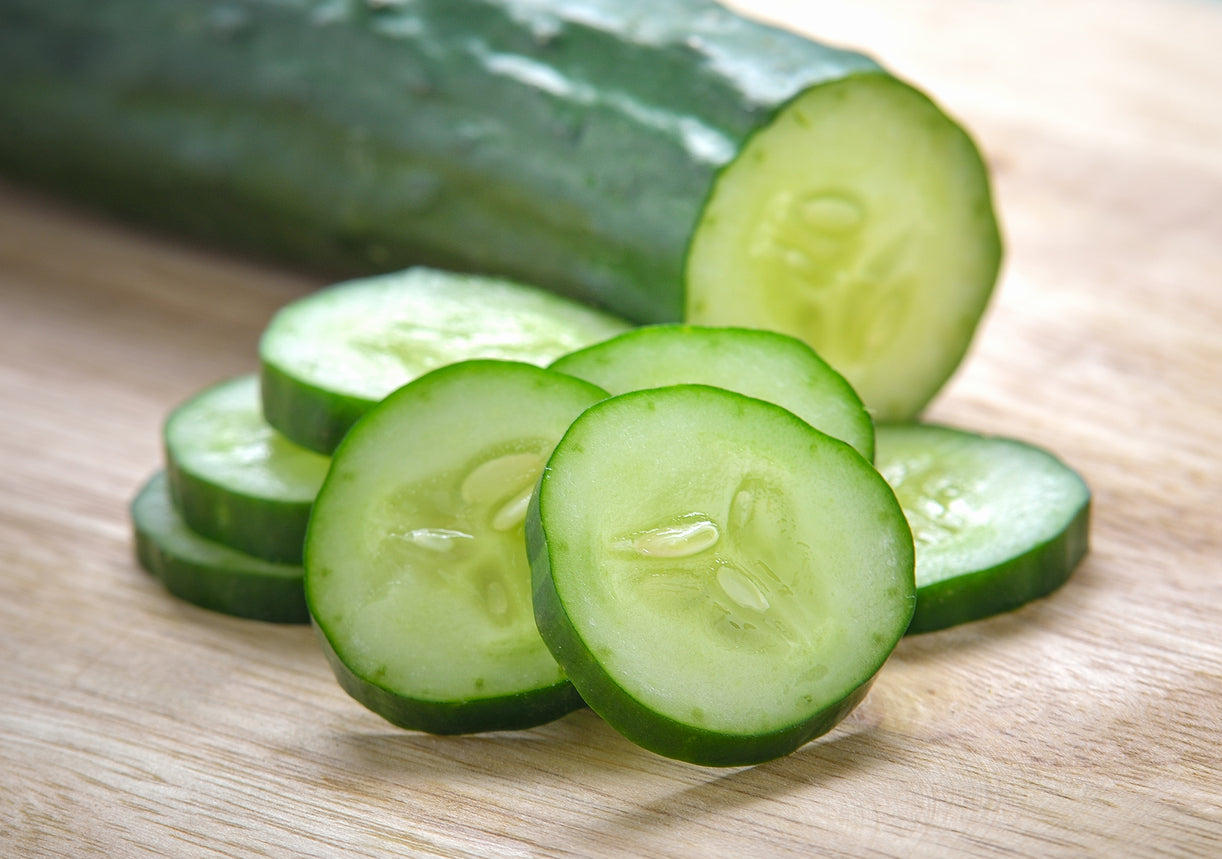Hidden Health Superpowers of Cucumbers

Cucumbers - a common addition to mixed salads - could almost be said to be the “Clark Kent” of the salad universe. While they may have a reputation for inoffensive mildness, cucumbers possess some major health-sustaining “superpowers” that may surprise you.
Cucumbers’ high levels of antioxidants, dietary fiber and essential micronutrients can work against two of the most serious chronic illnesses threatening the lives of Americans today: heart disease and type 2 diabetes. As if that weren’t enough reason to appreciate cucumbers, this refreshing fruit (yes, cucumbers are a fruit!) can contribute to proper hydration, which your body needs to stay healthy. Beyond a doubt, the amazing benefits of cucumbers deserve a closer look.
Cucumbers help prevent dehydration while providing important nutrients
Proper hydration - which helps to regulate temperature, transport nutrients and rid the body of waste products – is essential to health. As cucumbers contain a high percentage of water, eating them is a simple step you can take to make sure you are getting enough liquid in your diet. (Experts report that some people end up obtaining a surprising 40 percent of their liquid needs through food – and fruits and vegetables are an important source). Cucumbers’ generous water content, ample amounts of electrolytes and cool, refreshing consistency and flavor can be immensely helpful in increasing fluid intake - thereby helping to ward off dehydration and reducing risk of kidney stones. Proper hydration also promotes efficient digestion and can help prevent constipation.
Although cucumbers are 96 percent water, they manage to cram a surprising amount of vitamins and minerals into the remaining 4 percent. For example, a medium-sized, unpeeled cucumber contains 14 percent of the Recommended Dietary Intake for antioxidant vitamin C, 10 percent of the RDI for magnesium, 13 percent of the RDI for potassium and a whopping 62 percent of the RDI for vitamin K. Yet, the entire cucumber contains only 45 calories and virtually no fat – along with a respectable 2 grams of protein and 2 grams of beneficial dietary fiber. (Of course, most people don’t eat a whole cucumber at one sitting. What experts insist that you should eat, however, is the peel - which contains the lion’s share of the fiber and nutrients.) With a one-cup serving of sliced cucumber clocking in at a sparse 16 calories, cucumbers are definitely a low-calorie food.
Cucumbers may help combat type 2 diabetes
Cucumbers contain a group of potent antioxidants known as cucurbitacins – and researchers report that these natural compounds help to regulate the release of insulin and manage blood sugar. Cucumber peel has been shown to lower blood sugar and even reverse diabetes-related changes in animals. Cucumbers score very low on the glycemic index, and their content of pectin - a form of soluble fiber - may also help improve diabetes.
In addition, their high levels of water and fiber allow them to help to combat the obesity that can trigger diabetes. (Fiber requires more time to digest, thereby preventing overeating by helping your body realize that you are full.) Finally, cucumbers are anti-inflammatory, working against the systemic inflammation that can trigger the development of type 2 diabetes.
Vitamin K in cucumbers helps slash heart disease risk
Despite the onset of the Covid-19 pandemic, heart disease still constitutes the Number One killer of American adults, claiming over 655,000 lives a year. However, vitamin K in cucumbers may help cut the risk. In research just published in the prestigious Journal of the American Heart Association, the team found that participants who consumed a diet rich in vitamin K had up to a 34 percent lower risk of atherosclerosis-related heart disease. (In other words, vitamin K-rich diets can help slash the risk of this deadly disease by over a third!)
The researchers noted that vitamin K protects against calcium build-up in the major coronary arteries, thereby working against atherosclerosis and vascular calcification.
Interestingly, there are two forms of vitamin K. Vitamin K1 is found in plant-based foods, such as cucumbers, while vitamin K2 occurs in meat, eggs and aged cheese. Of the two, vitamin K1 appears to be more effective when it comes to preventing atherosclerosis.
And, this isn’t the only gift of cucumbers to heart health. The American Heart Association reports that fiber in cucumbers can help lower harmful LDL cholesterol. And, their levels of the essential minerals magnesium and potassium are believed to support healthy blood pressure.
Cucumbers are both a nutritious food and a natural beauty aid
In addition to their traditional use in salads and cold soups, cucumbers can be enjoyed with hummus, tahini or yogurt dip. You can also add cucumber slices, mint leaves and lime slices to chilled filtered water for a refreshing, cooling summer beverage. Or, pickle cucumbers by combining them with white vinegar, water, onion and salt and soaking overnight in the refrigerator.
Cucumbers can also be a boon to the complexion. They are a time-honored natural remedy to soothe swollen, irritated and sunburned skin – and you can even apply thin slices to the eye area and leave on for 20 minutes to reduce under eye puffiness.
Because cucumber juice has mildly astringent qualities, it can also be used to tighten and tone facial skin. (Simply apply and leave on for 30 minutes, then rinse well). By mixing cucumber juice in equal proportions with plain yogurt, you can create a facial mask to tighten and hydrate skin.
Although cucumbers may be known for their delicate taste, they are far from “pushovers.” Rather, they are a powerful ally in fighting disease.
Sources for this article include:






